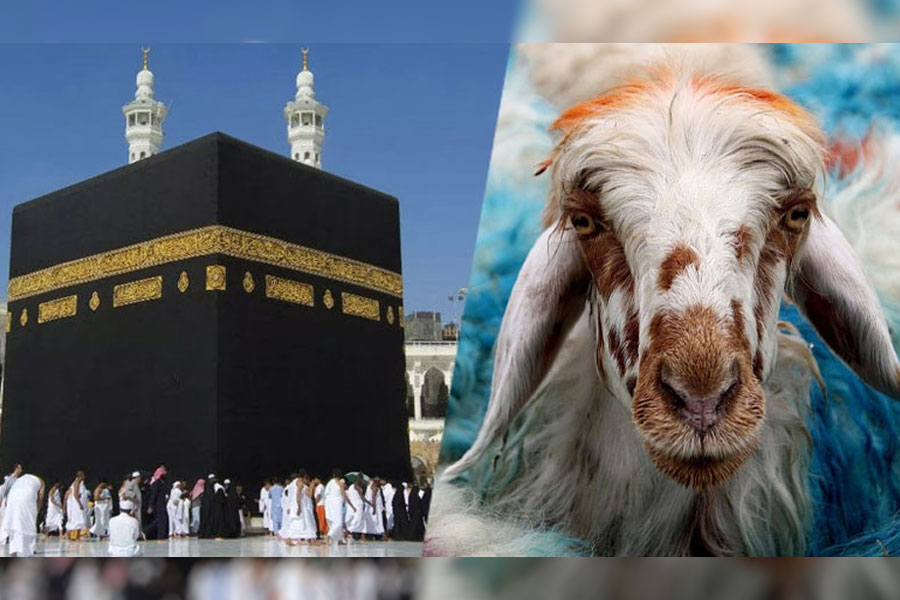- The federal government will cover the expenses of animal sacrifice during this year’s Hajj pilgrimage.
- The government is committed to providing optimal facilities for intending pilgrims.
- Approximately 185,000 individuals from Pakistan have expressed their intention to perform Hajj this year.
Minister for Religious Affairs, Senator Talha Mahmood, along with Interfaith Harmony, made an announcement on Sunday regarding the federal government’s decision to cover the expenses of animal sacrifice during this year’s Hajj pilgrimage.
During a press conference held in Islamabad, the federal minister emphasized that the government was fully committed to ensuring the provision of optimal facilities to the intending pilgrims for this year’s Hajj.
Senator Talha Mahmood revealed that a total of 185,000 individuals from Pakistan have expressed their intention to perform this sacred ritual in the upcoming pilgrimage.
He further highlighted that the costs associated with animal sacrifice had been incorporated into the overall Hajj expenditures, thereby relieving the intending pilgrims of any additional financial burden in this regard.
The senator acknowledged that the rise in Hajj expenses this year could be attributed to the devaluation of the Pakistani rupee. A comprehensive breakdown of the complete Hajj costs will soon be shared with the nation, allowing for a clearer understanding of the financial aspects involved.
Also Read:
Hajj 2023: Do Pakistani Women Still Need Mehram Despite New Policy?
In reference to the Road to Makkah project, Senator Mahmood mentioned that currently, only Islamabad Airport has been authorized as a departure point for this facilitation service. Consequently, intending pilgrims departing from the federal capital will be provided with exclusive facilities at this location.
Furthermore, he revealed that approximately 26,000 intending pilgrims will undergo the immigration process at Islamabad Airport.
The Religious Significance of Animal Sacrifice in Islam During Eid
Animal sacrifice holds deep religious significance in Islam during the festival of Eid. Known as Eid al-Adha or the Festival of Sacrifice, it commemorates the devotion and obedience of the Prophet Ibrahim (Abraham) towards Allah.
According to Islamic tradition, Ibrahim received a divine command to sacrifice his beloved son as a test of his faith. Displaying unwavering devotion, both Ibrahim and his son willingly submitted to Allah’s will. However, just as Ibrahim was about to carry out the sacrifice, Allah replaced his son with a ram, symbolizing the ultimate act of mercy and provision.
To honour this significant event, Muslims around the world engage in the ritual of animal sacrifice during Eid al-Adha. The sacrifice typically involves domestic animals like sheep, goats, cows, or camels. This act serves as a symbolic reminder of Ibrahim’s willingness to submit to Allah’s command, highlighting the importance of obedience, faith, and selflessness in the practice of Islam.
The sacrificial animal is carefully chosen, and certain conditions must be met to ensure its suitability. The animal should be in good health, free from any defects, and of a specified age. This attention to detail emphasizes the importance of offering the best to Allah, reflecting the notion of giving from one’s own resources and possessions as an act of devotion.
The meat from the sacrificed animal holds great significance as well. It is divided into three parts: one portion is retained by the family for consumption, one is shared with relatives and friends, and the final portion is given to the less fortunate and those in need. This act of distribution fosters a sense of communal harmony, compassion, and generosity, as Muslims strive to ensure that everyone can partake in the joyous occasion of Eid.
Beyond the physical act of sacrifice, Eid al-Adha also serves as a reminder of the greater meaning behind it. It encourages Muslims to reflect on their own willingness to submit to Allah’s commands and to exemplify the values of faith, obedience, and sacrifice in their daily lives. Moreover, it reminds individuals of the importance of gratitude, compassion, and the sharing of blessings with others.
Eid al-Adha is a significant occasion in the Islamic calendar, highlighting the story of Prophet Ibrahim’s unwavering faith and the profound message of sacrifice and devotion. It serves as a time for Muslims to deepen their spiritual connection, strengthen familial and community bonds, and embody the values of Islam in their actions and deeds.
Also Read:
5 Types of Mouth-Watering Biryani You Need to Try this Eid-Ul-Adha
Stay tuned to WOW360.
